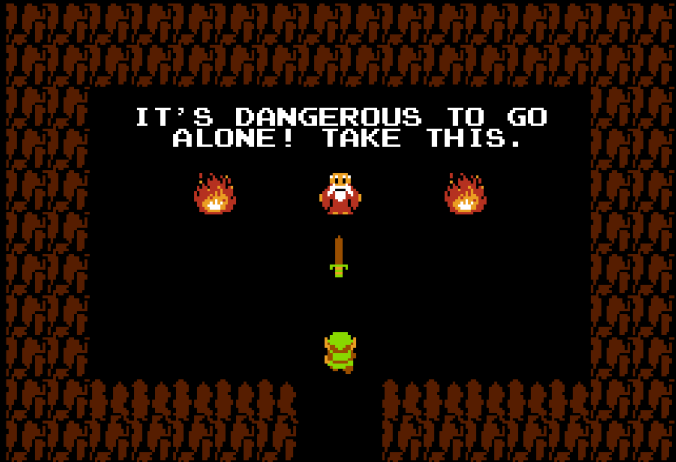
The Legend of Zelda, copyright Nintendo Co., Ltd.
Your journey against hyper-intelligent antagonists, pouty naysayers and those road warriors who illegally pass you on the emergency lane needs more than fists and a piece of paper. Martial arts training and a brooding vigilante complex didn’t make Batman. The tool belt made Batman. If you want to be a writer, a great writer who produces quality prose that commands the World’s attention, get used to the extra weight around your pelvis.
Two years ago, I finished the manuscript for NATURAL SELECTION, BOOK 1 of my young adult dark fantasy series CONCEPTION. I didn’t use any tools. I didn’t study or practice the writing craft. I merely poured my exposition, characters and dialog – my world – into Microsoft Word until the soul offered a firm handshake to the brain and they pranced out into the night to celebrate. The end result? Garbage.
“B-but why, Alvin?” Asked my drunken spirit while the cerebellum prepared the defense’s opening statement. “It had the themes, the emotion; it had the imagery. It painted colorful characters and weaved them into the high-staked story you wanted!”
“The writing, man. The writing sucks,” I said and stormed past the screen door.
NATURAL SELECTION’s first draft – and second and third and tenth – stumbled about with weak verbs on wobbling crutches made of adverbs (e.g. walked slowly instead of sauntered, or walked quickly instead of hurried); lazy descriptions (e.g. the great big mountain vs. the mountain towered); amateur dialog tags (e.g. Joseph said, Mary replied, little Jesus hollered) and my favorite, and by favorite, I mean bang-head-against-wall hellish: enough passive voice to melt action scenes into PowerPoint slides.
Tools like Hemingway App and AutoCrit saved the day and about 200 editing hours later, I produced a polished manuscript composed of beautiful prose.
Then, I lost my voice.
Protect that precious voice box. The endless task of self-improvement through the torturous realm of editing is coarse. The tools were designed for quality, specifically molding your hands to create what publishers and literary agents consider quality writing. Yet, they have the side effect of making you sound like a drone. If this lasts more than six hours, you should definitely contact your doctor… or an exorcist.
I glanced at the hospital on my way to church but rebelled and hired myself a chemist instead. Together, we brewed the following formula to guide my prose:
- Write whole chapters to your fingertips’ delight. Write and write, unjudged, untested, free words belonging only to the wind and yourself.
- Let your art sit for a day or two, and take plenty of showers to let the shower thoughts run. More so, if lots of good plot points were involved. Plot points, like wet cement, need to set just right.
- Pick up some tools and put your words on the grinder. Shave off those adverbs and correct your pacing. Remove unnecessary filler words (e.g. that, then and just), excessive dialog tags and clichés (no one needs to hear “Forget everything you think you know!” again). And lastly (Gasp, an adverb!): revise overuse of the passive voice.
- Re-read the piece, fix and tweak, until your voice is smeared all over that thing like a buttered-up, Aunt Jemima-oozing, stack of pancakes.
You’ll be exhausted after this and crawl out asking why the hell you write at all; questioning whether it’s worth the trauma to publish professionally. Have a drink, or a chat with a good friend. Remind yourself you write because the world needs your voice.
Yes, yes it does. And pardon the cliché, but it does get better over time. I found my new eyes the best outcome of the grinder and can now produce a higher quality first draft. The tools trained me to recognize the glitches. Some even plague this post (Gasp, again!)
There are no shortcuts here. Write every day, edit every other day. Then band with others who love the same craft. Find one better at it, and learn. Find one worse, and teach. That is the key.
Of them I’ll talk on the next Tools post. Them, wielders of truth. Banner men and women, unafraid to lunge their sword and cut you, but never hesitant to loan their shield. It is of them Zelda’s wise man in the cave spoke when he said:
I wish I had read this 10 years ago. I went through the same thing with SLS, I felt what I was writing but the writing itself was garbage. Working hard on the new one. Thank you for the tool recommendations.
LikeLike
They say every writer suffers through this purification process. A frustrating experience, to say the least, but I can’t complain given the wisdom gained…
I take it back: I still complain. LOUDLY! AND WITH ADVERBS! 😉
Good journey on that new novel!
LikeLike
Pingback: Professional editor shares eerily familiar advice on producing a higher quality manuscript. | Alvin's House of Words
Great advices…
LikeLiked by 1 person
Thank you! Sharing our writing blunders is important. Together, we are stronger 🙂
LikeLiked by 1 person
Great post!
I do use tools as well, but I didn’t know about Hemmingway or Autocrit. I tried Grammarly and ProWritingAid, but ended up with ProWritingAId which also helps with blogging @ WordPress. I tried Scrivener for a day but I can’t get myself to like it, or to justify it. Maybe one day.
LikeLiked by 1 person
Thank you, and thanks for reading. I tried Scrivener too, but Microsoft Word lured me back.
I’ll check out ProWritingAid and bring an extra Ziploc bag so the voice box doesn’t get soggy 😁
LikeLike
Pingback: A writer is never alone. | Alvin's House of Words